Fleurs du Mal Magazine



Verdwijnpunt
Zij die deze kasseien en sporen legden
gaven hun lijven al lang geleden terug.
Maar eerder, eerder zegden zij dat ze
geloofden. Zegden zij dat ze wel wisten
hoe alles zat. Hun onherinnerde dromen
wemelden van de oorlog die nog moest
komen, duister als de kleur die de rivier
’s avonds heeft. Er zweemt een heimwee
over deze stenen, maar het is niet klaar
waarnaar. Moet er eigenlijk niet een dun
lijntje om alles heen? Met richtingwijzers?
Toekomst heeft de kraag ruig omhoog.
Bert Bevers
Gedicht: Verdwijnpunt
Eerder verschenen in Schaduw, District Hoboken, 2014
Bert Bevers is a poet and writer who lives and works in Antwerp (Be)
• fleursdumal.nl magazine
More in: Archive A-B, Archive A-B, Bevers, Bert
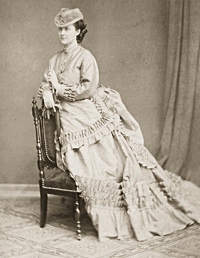
Der Krieg
Aus Plewna wandert ein Geisterzug,
Die türkischen Helden gefangen,
In Fetzen und barfuss, von Hunger verzehrt,
Die Glieder schlottern und hangen.
Viel Tausende wanken wie Schatten dahin,
Zur Donau ziehen die Armen,
Die nächtlichen Wolken durchheult der Wind,
Laut brüllend, wie Schlachtenerbarmen.
In lautloser Stille, so wandern sie hin
Durch schneeverdichtete Fluren,
Bedeckt mit Leichen – die Raben und Kräh’n
Verkünden der Fallenden Spuren.
Nur Leichen liegen von Plewna hin
Zur Donau in Reihen gesäet,
Ein grässlich’ Schlachtfeld, wo Ross und Mann
Am Wagen erfroren, verwehet.
Die Wandernden schreien um Hülfe noch,
Dann knien sie, beten stille,
Mit ihren Armen gen Morgenland,
Und sterben -‘s ist Allahs Wille.
Von Plewna zur Donau, wer Kräfte hat,
Vollendet die grausige Reise,
Da glitzert düster im Abendrot
Nicropolis, starrend von Eise.
Und rings ertönt ein Heulen und Schrei’n:
“O wollet uns Speise doch geben!
Was habt Ihr nicht lieber erschossen uns gleich!”
Die Lüfte, die eisigen, beben.
Zehntausend Gefangene schreien nach Brot,
Kein Brot ist zur Stunde zu haben,
Und markerschütternd durchtobt der Schrei
Die Straßen, die Wälle, den Graben.
Zehntausend liegen in jener Nacht
Verhungernd, mit sterbendem Munde,
Die Sieger sind selber von Tod bedroht –
Kein Brot! und nur Eis in der Runde!
Kein Brot! Und von jenseits da winkt das Land,
In dem lange verheißenen Frieden,
Doch hat sie die Donau mit krachendem Eis
In gewaltigen Massen geschieden.
Kein Brot! und es frieret in jener Nacht,
Als hätte Natur sich geschworen,
Den beiden Heeren den Untergang,
Fast waren sie alle verloren.
Doch endlich grauet der Tag, es kann
Die Panzerbarkasse nun wagen,
Vom Eis getragen! ein wenig Brot
Zu gemarterten Helden zu tragen.
Carmen Sylva
(1843-1916)
Der Krieg
Gedicht
• fleursdumal.nl magazine
More in: Archive S-T, Archive S-T, CLASSIC POETRY, WAR & PEACE
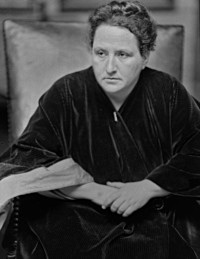 A Poem About Waldberg
A Poem About Waldberg
What I am afraid of is that they will just attract an awful bombardment on themselves in which they will have to be supported.
Oh no they won’t do that.
I don’t think they will do that.
What I think is that I will have to reach the country before I ask myself the way to see the city.
I don’t mean this as a joke.
I know very well that I know all about nurses. Who doesn’t. And who would like to see children win. I love my boy very much. His mother feeds him. I can smile and think of it. We both laugh together. Altogether I have said to them keep still.
Curtains a japanese curtain.
Complete flowers.
I never use a pass.
Of course you wouldn’t.
You wouldn’t be careful enough. I don’t mean that.
How can I hear him speak. You don’t mean a victim. Eugene Paul. What is Walberg’s name.
I don’t care for him.
I am not sorry for her.
I do not have flowers here.
C A L I F O R N I A
Let me see. What do you say. They can take care of riches. Kiss my hand. Why. Because Russians are rich. All Russians are valuable. That is what I said.
I wish I could be as funny as he is.
Yes thank you I believe in Russia.
Gertrude Stein
(1874-1946)
A Poem About Waldberg
• fleursdumal.nl magazine
More in: Archive S-T, Archive S-T, Gertrude Stein, Stein, Gertrude
Christian Kunda Mutoki porte un nouveau regard sur Le Horla de Guy de Maupassant.
 Il est précédé d’une préface et suivi d’une postface.
Il est précédé d’une préface et suivi d’une postface.
Il vient rafraîchir les problématiques qui touchent à la morale, à l’athéisme, à des amours tumultueuses et infidèles. . .
Le monde d’aujourd’hui diffère-t-il de celui décrit au XIXe siècle par l’écrivain français ? La science a-t-elle amélioré la condition existentielle de l’homme ?
Voici quelques questions majeures qui trouvent ici un regard neuf.
Christian Kunda Mutoki a préparé sa thèse de doctorat à l’Université Paul Verlaine, actuelle Université de la Lorraine (Metz, France). Il est écrivain et professeur de Littérature et civilisation françaises à l’Université de Lubumbashi, en RDC.
GUY DE MAUPASSANT
Une certaine idée de l’homme dans Le Horla
Christian Kunda Mutoki
Cahiers des sciences du langage
Langue Linguistique Littérature
Broché
Format : 15,5 x 24 cm
ISBN : 978-2-8066-3665-2
14 décembre 2018
70 pages
€ 11,5
# New books
Une certaine idée de l’homme dans Le Horla
de Guy de Maupassant
Christian Kunda Mutoki
• fleursdumal.nl magazine
More in: - Book News, - Bookstores, Archive M-N, Archive M-N, Art & Literature News, Guy de Maupassant, Maupassant, Guy de, Maupassant, Guy de
THE RACE QUESTION
Scene—Race track. Enter old coloured man, seating himself.
“Oomph, oomph. De work of de devil sho’ do p’ospah. How ‘do, suh? Des tol’able, thankee, suh. How you come on? Oh, I was des a-sayin’ how de wo’k of de ol’ boy do p’ospah. Doesn’t I frequent the racetrack? No, suh; no, suh. I’s Baptis’ myse’f, an’ I ‘low hit’s all devil’s doin’s. Wouldn’t ‘a’ be’n hyeah to-day, but I got a boy named Jim dat’s long gone in sin an’ he gwine ride one dem hosses. Oomph, dat boy! I sut’ny has talked to him and labohed wid him night an’ day, but it was allers in vain, an’ I’s feahed dat de day of his reckonin’ is at han’.
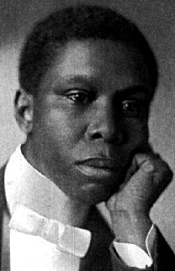 “Ain’t I nevah been intrusted in racin’? Humph, you don’t s’pose I been dead all my life, does you? What you laffin’ at? Oh, scuse me, scuse me, you unnerstan’ what I means. You don’ give a ol’ man time to splain hisse’f. What I means is dat dey has been days when I walked in de counsels of de on-gawdly and set in de seats of sinnahs; and long erbout dem times I did tek most ovahly strong to racin’.
“Ain’t I nevah been intrusted in racin’? Humph, you don’t s’pose I been dead all my life, does you? What you laffin’ at? Oh, scuse me, scuse me, you unnerstan’ what I means. You don’ give a ol’ man time to splain hisse’f. What I means is dat dey has been days when I walked in de counsels of de on-gawdly and set in de seats of sinnahs; and long erbout dem times I did tek most ovahly strong to racin’.
“How long dat been? Oh, dat’s way long back, ‘fo’ I got religion, mo’n thuty years ago, dough I got to own I has fell from grace several times sense.
“Yes, suh, I ust to ride. Ki-yi! I nevah furgit de day dat my ol’ Mas’ Jack put me on ‘June Boy,’ his black geldin’, an’ say to me, ‘Si,’ says he, ‘if you don’ ride de tail offen Cunnel Scott’s mare, “No Quit,” I’s gwine to larrup you twell you cain’t set in de saddle no mo’.’ Hyah, hyah. My ol’ Mas’ was a mighty han’ fu’ a joke. I knowed he wan’t gwine to do nuffin’ to me.
“Did I win? Why, whut you spec’ I’s doin’ hyeah ef I hadn’ winned? W’y, ef I’d ‘a’ let dat Scott maih beat my ‘June Boy’ I’d ‘a’ drowned myse’f in Bull Skin Crick.
“Yes, suh, I winned; w’y, at de finish I come down dat track lak hit was de Jedgment Day an’ I was de las’ one up! Ef I didn’t race dat maih’s tail clean off, I ‘low I made hit do a lot o’ switchin’. An’ aftah dat my wife Mandy she ma’ed me. Hyah, hyah, I ain’t bin much on hol’in’ de reins sence.
“Sh! dey comin’ in to wa’m up. Dat Jim, dat Jim, dat my boy; you nasty putrid little rascal. Des a hundred an’ eight, suh, des a hundred an’ eight. Yas, suh, dat’s my Jim; I don’t know whaih he gits his dev’ment at.
“What’s de mattah wid dat boy? Whyn’t he hunch hisse’f up on dat saddle right? Jim, Jim, whyn’t you limber up, boy; hunch yo’se’f up on dat hoss lak you belonged to him and knowed you was dah. What I done showed you? De black raskil, goin’ out dah tryin’ to disgrace his own daddy. Hyeah he come back. Dat’s bettah, you scoun’ril.
“Dat’s a right smaht-lookin’ hoss he’s a-ridin’, but I ain’t a-trustin’ dat bay wid de white feet—dat is, not altogethah. She’s a favourwright too; but dey’s sumpin’ else in dis worl’ sides playin’ favourwrights. Jim bettah had win dis race. His hoss ain’t a five to one shot, but I spec’s to go way fum hyeah wid money ernuff to mek a donation on de pa’sonage.
“Does I bet? Well, I don’ des call hit bettin’; but I resks a little w’en I t’inks I kin he’p de cause. ‘Tain’t gamblin’, o’ co’se; I wouldn’t gamble fu nothin’, dough my ol’ Mastah did ust to say dat a honest gamblah was ez good ez a hones’ preachah an’ mos’ nigh ez skace.
“Look out dah, man, dey’s off, dat nasty bay maih wid de white feet leadin’ right fu’m ‘de pos’. I knowed it! I knowed it! I had my eye on huh all de time. Oh, Jim, Jim, why didn’t you git in bettah, way back dah fouf? Dah go de gong! I knowed dat wasn’t no staht. Troop back dah, you raskils, hyah, hyah.
“I wush dat boy wouldn’t do so much jummying erroun’ wid dat hoss. Fust t’ing he know he ain’t gwine to know whaih he’s at.
“Dah, dah dey go ag’in. Hit’s a sho’ t’ing dis time. Bettah, Jim, bettah. Dey didn’t leave you dis time. Hug dat bay mare, hug her close, boy. Don’t press dat hoss yit. He holdin’ back a lot o’ t’ings.
“He’s gainin’! doggone my cats, he’s gainin’! an’ dat hoss o’ his’n gwine des ez stiddy ez a rockin’-chair. Jim allus was a good boy.
“Confound these spec’s, I cain’t see ’em skacely; huh, you say dey’s neck an’ neck; now I see ’em! now I see ’em! and Jimmy’s a-ridin’ like——Huh, huh, I laik to said sumpin’.
“De bay maih’s done huh bes’, she’s done huh bes’! Dey’s turned into the stretch an’ still see-sawin’. Let him out, Jimmy, let him out! Dat boy done th’owed de reins away. Come on, Jimmy, come on! He’s leadin’ by a nose. Come on, I tell you, you black rapscallion, come on! Give ’em hell, Jimmy! give ’em hell! Under de wire an’ a len’th ahead. Doggone my cats! wake me up w’en dat othah hoss comes in.
“No, suh, I ain’t gwine stay no longah, I don’t app’ove o’ racin’, I’s gwine ‘roun’ an’ see dis hyeah bookmakah an’ den I’s gwine dreckly home, suh, dreckly home. I’s Baptis’ myse’f, an’ I don’t app’ove o’ no sich doin’s!”
Paul Laurence Dunbar
(1872 – 1906)
The Race Question
From The Heart Of Happy Hollow, a collection of short stories reprinted in 1904 by Dodd, Mead and Company, New York.
Short story
• fleursdumal.nl magazine
More in: *Archive African American Literature, Archive C-D, Archive C-D, Dunbar, Paul Laurence, Dunbar, Paul Laurence, Paul Laurence Dunbar, Paul Laurence Dunbar
The final book from one of Europe’s cultural giants: an entertaining collection of essays about the modern world – from unbridled individualism to mobile phones.
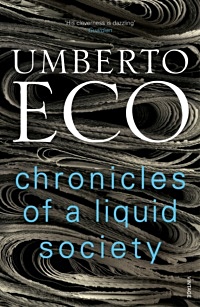 Umberto Eco was an international cultural superstar. A celebrated essayist as well as novelist, in this, his last collection, he explores many aspects of the modern world with irrepressible curiosity and wisdom written in his uniquely ironic voice.
Umberto Eco was an international cultural superstar. A celebrated essayist as well as novelist, in this, his last collection, he explores many aspects of the modern world with irrepressible curiosity and wisdom written in his uniquely ironic voice.
Written by Eco as articles for his regular column in l’Espresso magazine, he brings his dazzling erudition, incisiveness and keen sense of the everyday to bear on topics such as popular culture and politics, unbridled individualism, conspiracies, the old and the young, mobile phones, mass media, racism, good manners and the crisis in ideological values.
It is a final gift to his readers – astute, witty and illuminating.
“ A swan song from one of Europe’s great intellectuals…Eco entertains with his intellect, humor, and insatiable curiosity…there’s much here to enjoy and ponder ”. Tim Parks, Guardian
Chronicles of a Liquid Society
by Umberto Eco
Paperback
ISBN 9781784705206
Hardback
ISNB 9781911215318
2017/2018
Harvill Secker / Vintage
320 pages
Language & Literary Studies
# New books
Chronicles of a Liquid Society
by Umberto Eco
• fleursdumal.nl magazine
More in: - Book News, - Bookstores, Archive E-F, Art & Literature News, AUDIO, CINEMA, RADIO & TV, DICTIONARY OF IDEAS, MONTAIGNE, Museum of Literary Treasures, NONFICTION: ESSAYS & STORIES, Umberto Eco
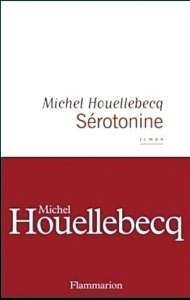 «Mes croyances sont limitées, mais elles sont violentes. Je crois à la possibilité du royaume restreint. Je crois à l’amour» écrivait récemment Michel Houellebecq.
«Mes croyances sont limitées, mais elles sont violentes. Je crois à la possibilité du royaume restreint. Je crois à l’amour» écrivait récemment Michel Houellebecq.
Le narrateur de Sérotonine approuverait sans réserve. Son récit traverse une France qui piétine ses traditions, banalise ses villes, détruit ses campagnes au bord de la révolte. Il raconte sa vie d’ingénieur agronome, son amitié pour un aristocrate agriculteur (un inoubliable personnage de roman – son double inversé), l’échec des idéaux de leur jeunesse, l’espoir peut-être insensé de retrouver une femme perdue.
Ce roman sur les ravages d’un monde sans bonté, sans solidarité, aux mutations devenues incontrôlables, est aussi un roman sur le remords et le regret.
Michel Houellebecq
Sérotonine
Littérature française
Flammarion
À paraître le 04/01/2019
352 pages
139 x 210 mm
Broché
EAN : 9782081471757
ISBN : 9782081471757
€ 22,00
# Nouveau roman
Michel Houellebecq
Sérotonine
•fleursdumal.nl magazine
More in: - Book News, - Bookstores, Archive G-H, Art & Literature News, Michel Houellebecq
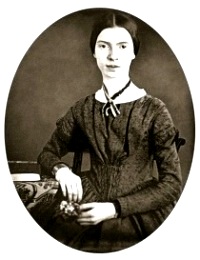
Wild nights – Wild nights!
Wild nights – Wild nights!
Were I with thee
Wild nights should be
Our luxury!
Futile – the winds –
To a Heart in port –
Done with the Compass –
Done with the Chart!
Rowing in Eden –
Ah – the Sea!
Might I but moor – tonight –
In thee!
Emily Dickinson
(1830-1886)
Wild nights – Wild nights!
• fleursdumal.nl magazine
More in: Archive C-D, Archive C-D, Dickinson, Emily
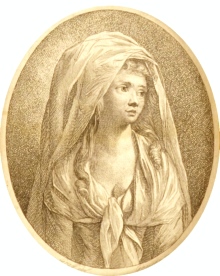
Sehnsucht
Entfernter Freund!
Um den auf immer
Im stillen Zimmer
Mein Auge weint;
Dann, wenn die Sterne
Am Himmel blinken,
Und Liebe winken,
Denk ich der Ferne
In der du, ach!
Jetzt um mich leidest,
Und Freuden meidest,
Mit Thränen nach.
Und wenn mein Freund
Im Stralenkleide,
Zu meinem Leide
Mitleidig scheint;
Da werf ich mich,
Mit stummen Sehnen
Und tausend Thränen –
O! sähst du mich!
An jene Flüsse
Zur Erde nieder,
Die unsre Lieder
Und unsere Küsse
Beym Sternenschein
So oft belauschten,
und sanfter rauschten
Durch diesen Hayn –
Ach! keine Lieder
Und keine Küsse,
Ihr – Hayn – und Flüsse!
Belauscht ihr wieder –
Und denk an dich,
An jene Zeiten,
So voller Freuden
Für mich und dich;
Dann ruf ich dich
Durch alle Wälder,
Durch Thal und Felder
Als hört’st du mich.
Und wüst und schaurig
Ist Hayn – und Trifte,
Wie Todtengrüfte,
So bang und traurig.
O! Mond und Sterne,
Blickt tausend Küsse
Und tausend Grüsse
Dem in der Ferne,
Ihr könnt’ ihn finden!
So ruf und weine
Ich oft alleine
In öden Gründen.
So lächelt dir
Der Mond oft Küsse
So traurig süsse
Mein Freund von mir.
Sophie Albrecht
(1757-1840)
Gedicht
Im Junius 1783
• fleursdumal.nl magazine
More in: Archive A-B, Archive A-B, CLASSIC POETRY, Galerie Deutschland
The Blind Spot
“You’ve just come back from Adelaide’s funeral, haven’t you?” said Sir Lulworth to his nephew; “I suppose it was very like most other funerals?”
“I’ll tell you all about it at lunch,” said Egbert.
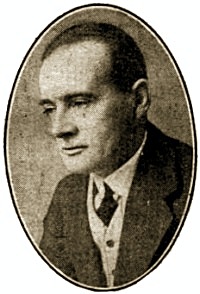 “You’ll do nothing of the sort. It wouldn’t be respectful either to your great-aunt’s memory or to the lunch. We begin with Spanish olives, then a borshch, then more olives and a bird of some kind, and a rather enticing Rhenish wine, not at all expensive as wines go in this country, but still quite laudable in its way. Now there’s absolutely nothing in that menu that harmonises in the least with the subject of your great-aunt Adelaide or her funeral. She was a charming woman, and quite as intelligent as she had any need to be, but somehow she always reminded me of an English cook’s idea of a Madras curry.”
“You’ll do nothing of the sort. It wouldn’t be respectful either to your great-aunt’s memory or to the lunch. We begin with Spanish olives, then a borshch, then more olives and a bird of some kind, and a rather enticing Rhenish wine, not at all expensive as wines go in this country, but still quite laudable in its way. Now there’s absolutely nothing in that menu that harmonises in the least with the subject of your great-aunt Adelaide or her funeral. She was a charming woman, and quite as intelligent as she had any need to be, but somehow she always reminded me of an English cook’s idea of a Madras curry.”
“She used to say you were frivolous,” said Egbert. Something in his tone suggested that he rather endorsed the verdict.
“I believe I once considerably scandalised her by declaring that clear soup was a more important factor in life than a clear conscience. She had very little sense of proportion. By the way, she made you her principal heir, didn’t she?”
“Yes,” said Egbert, “and executor as well. It’s in that connection that I particularly want to speak to you.”
“Business is not my strong point at any time,” said Sir Lulworth, “and certainly not when we’re on the immediate threshold of lunch.”
“It isn’t exactly business,” explained Egbert, as he followed his uncle into the dining-room.
“It’s something rather serious. Very serious.”
“Then we can’t possibly speak about it now,” said Sir Lulworth; “no one could talk seriously during a borshch. A beautifully constructed borshch, such as you are going to experience presently, ought not only to banish conversation but almost to annihilate thought. Later on, when we arrive at the second stage of olives, I shall be quite ready to discuss that new book on Borrow, or, if you prefer it, the present situation in the Grand Duchy of Luxemburg. But I absolutely decline to talk anything approaching business till we have finished with the bird.”
For the greater part of the meal Egbert sat in an abstracted silence, the silence of a man whose mind is focussed on one topic. When the coffee stage had been reached he launched himself suddenly athwart his uncle’s reminiscences of the Court of Luxemburg.
“I think I told you that great-aunt Adelaide had made me her executor. There wasn’t very much to be done in the way of legal matters, but I had to go through her papers.”
“That would be a fairly heavy task in itself. I should imagine there were reams of family letters.”
“Stacks of them, and most of them highly uninteresting. There was one packet, however, which I thought might repay a careful perusal. It was a bundle of correspondence from her brother Peter.”
“The Canon of tragic memory,” said Lulworth.
“Exactly, of tragic memory, as you say; a tragedy that has never been fathomed.”
“Probably the simplest explanation was the correct one,” said Sir Lulworth; “he slipped on the stone staircase and fractured his skull in falling.”
Egbert shook his head. “The medical evidence all went to prove that the blow on the head was struck by some one coming up behind him. A wound caused by violent contact with the steps could not possibly have been inflicted at that angle of the skull. They experimented with a dummy figure falling in every conceivable position.”
“But the motive?” exclaimed Sir Lulworth; “no one had any interest in doing away with him, and the number of people who destroy Canons of the Established Church for the mere fun of killing must be extremely limited. Of course there are individuals of weak mental balance who do that sort of thing, but they seldom conceal their handiwork; they are more generally inclined to parade it.”
“His cook was under suspicion,” said Egbert shortly.
“I know he was,” said Sir Lulworth, “simply because he was about the only person on the premises at the time of the tragedy. But could anything be sillier than trying to fasten a charge of murder on to Sebastien? He had nothing to gain, in fact, a good deal to lose, from the death of his employer. The Canon was paying him quite as good wages as I was able to offer him when I took him over into my service. I have since raised them to something a little more in accordance with his real worth, but at the time he was glad to find a new place without troubling about an increase of wages. People were fighting rather shy of him, and he had no friends in this country. No; if anyone in the world was interested in the prolonged life and unimpaired digestion of the Canon it would certainly be Sebastien.”
“People don’t always weigh the consequences of their rash acts,” said Egbert, “otherwise there would be very few murders committed. Sebastien is a man of hot temper.”
“He is a southerner,” admitted Sir Lulworth; “to be geographically exact I believe he hails from the French slopes of the Pyrenees. I took that into consideration when he nearly killed the gardener’s boy the other day for bringing him a spurious substitute for sorrel. One must always make allowances for origin and locality and early environment; ‘Tell me your longitude and I’ll know what latitude to allow you,’ is my motto.”
“There, you see,” said Egbert, “he nearly killed the gardener’s boy.”
“My dear Egbert, between nearly killing a gardener’s boy and altogether killing a Canon there is a wide difference. No doubt you have often felt a temporary desire to kill a gardener’s boy; you have never given way to it, and I respect you for your self-control. But I don’t suppose you have ever wanted to kill an octogenarian Canon. Besides, as far as we know, there had never been any quarrel or disagreement between the two men. The evidence at the inquest brought that out very clearly.”
“Ah!” said Egbert, with the air of a man coming at last into a deferred inheritance of conversational importance, “that is precisely what I want to speak to you about.”
He pushed away his coffee cup and drew a pocket-book from his inner breast-pocket. From the depths of the pocket-book he produced an envelope, and from the envelope he extracted a letter, closely written in a small, neat handwriting.
“One of the Canon’s numerous letters to Aunt Adelaide,” he explained, “written a few days before his death. Her memory was already failing when she received it, and I daresay she forgot the contents as soon as she had read it; otherwise, in the light of what subsequently happened, we should have heard something of this letter before now. If it had been produced at the inquest I fancy it would have made some difference in the course of affairs. The evidence, as you remarked just now, choked off suspicion against Sebastien by disclosing an utter absence of anything that could be considered a motive or provocation for the crime, if crime there was.”
“Oh, read the letter,” said Sir Lulworth impatiently.
“It’s a long rambling affair, like most of his letters in his later years,” said Egbert. “I’ll read the part that bears immediately on the mystery.
“‘I very much fear I shall have to get rid of Sebastien. He cooks divinely, but he has the temper of a fiend or an anthropoid ape, and I am really in bodily fear of him. We had a dispute the other day as to the correct sort of lunch to be served on Ash Wednesday, and I got so irritated and annoyed at his conceit and obstinacy that at last I threw a cupful of coffee in his face and called him at the same time an impudent jackanapes. Very little of the coffee went actually in his face, but I have never seen a human being show such deplorable lack of self-control. I laughed at the threat of killing me that he spluttered out in his rage, and thought the whole thing would blow over, but I have several times since caught him scowling and muttering in a highly unpleasant fashion, and lately I have fancied that he was dogging my footsteps about the grounds, particularly when I walk of an evening in the Italian Garden.’
“It was on the steps in the Italian Garden that the body was found,” commented Egbert, and resumed reading.
“‘I daresay the danger is imaginary; but I shall feel more at ease when he has quitted my service.’”
Egbert paused for a moment at the conclusion of the extract; then, as his uncle made no remark, he added: “If lack of motive was the only factor that saved Sebastien from prosecution I fancy this letter will put a different complexion on matters.”
“Have you shown it to anyone else?” asked Sir Lulworth, reaching out his hand for the incriminating piece of paper.
“No,” said Egbert, handing it across the table, “I thought I would tell you about it first. Heavens, what are you doing?”
Egbert’s voice rose almost to a scream. Sir Lulworth had flung the paper well and truly into the glowing centre of the grate. The small, neat handwriting shrivelled into black flaky nothingness.
“What on earth did you do that for?” gasped Egbert. “That letter was our one piece of evidence to connect Sebastien with the crime.”
“That is why I destroyed it,” said Sir Lulworth.
“But why should you want to shield him?” cried Egbert; “the man is a common murderer.”
“A common murderer, possibly, but a very uncommon cook.”
The Blind Spot
From ‘Beasts and Super-Beasts’
by Saki (H. H. Munro)
(1870 – 1916)
• fleursdumal.nl magazine
More in: Archive S-T, Saki, Saki, The Art of Reading
`Als we China hebben gezien, zullen we pas begrijpen hoe nietig het hier allemaal is’, zegt Tijger.
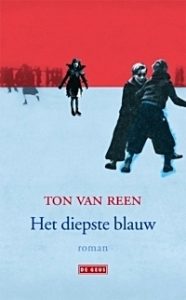 `Hoe klein het dorp is, hoe smal de beek, hoe de fabriek stinkt.’
`Hoe klein het dorp is, hoe smal de beek, hoe de fabriek stinkt.’
`Jij hoeft helemaal niet op reis te gaan om dat te ontdekken’, zegt Thija. `Jij weet het nu al.’
`Na de zomervakantie gaan we ieder naar een andere school’, zegt Tijger.
`Het is ellendig’, zegt Mels. `Ik wil helemaal niet naar een andere school. We moeten bij elkaar blijven.’
`We hebben er niets over te zeggen’, zegt Tijger. `Het is allemaal al beslist.’
`Stom’, zegt Thija. `Ik zal jullie maanden niet zien.’
`Dat is het ergst van alles,’ zegt Mels, `dat jij naar kostschool moet.’
`Ik wil het niet. Mijn váder wil het.’
`Ons vragen ze niets’, zegt Mels.
Ton van Reen: Het diepste blauw (085)
wordt vervolgd
fleursdumal.nl magazine
More in: - Book News, - Het diepste blauw, Archive Q-R, Reen, Ton van
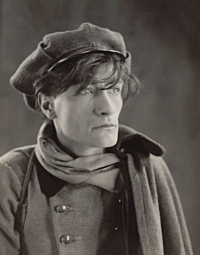
Qui suis-je ?
Qui suis-je ?
D’où je viens ?
Je suis Antonin Artaud
et que je le dise
comme je sais le dire
immédiatement
vous verrez mon corps actuel
voler en éclats
et se ramasser
sous dix mille aspects
notoires
un corps neuf
où vous ne pourrez
plus jamais
m’oublier.
Antonin Artaud
Poème
Qui suis-je ?
(1896 – 1948)
• fleursdumal.nl magazine
More in: Antonin Artaud, Archive A-B, Archive A-B, Artaud, Antonin
Thank you for reading Fleurs du Mal - magazine for art & literature